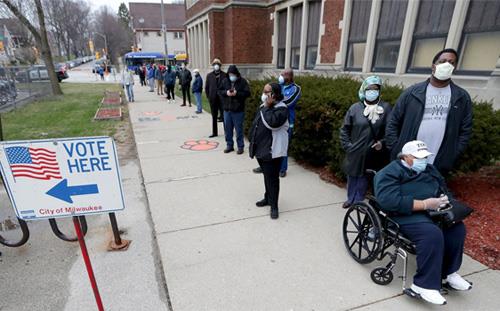
Let's say you decide to turn Tuesday into a documentary film festival. You ignore the rest of TV – Voice, Bachelorette, even the World Series – and watch two PBS films back-to-back. It's American Masters at 9 p.m. ET and Frontline at 10:30 p.m. ET (check local listings).
Chances are, you'll emerge impressed. These films are richly crafted yet thoroughly different.
The Masters film – Walter Winchell: The Power of Gossip – is set mostly in the 1930s to 1950s; the Frontline one – Whose Vote Counts? – has a current urgency.
The Masters film has a lightness; Winchell destroyed lives, but his flair and audacity make it an interesting ride. The Frontline documentary, about obstacles to voting, is dark and solemn. But both are beautifully made.
Add two more films – pandas on Nature (8 p.m. ET, Wednesday), and a genial portrait of conductor Michael Tilson Thomas on a second American Masters (9 p.m. ET, Friday) – and you'll see how good and varied PBS documentaries can be.
Here are Tuesday's offerings:
AMERICAN MASTERS: At first, it's easy to root for Walter Winchell.
The son of Jewish immigrants, he grew up poor in New York and worked to support his family. By 6th grade, he had left school to work in vaudeville. He began typing a little newsletter for other performers and transformed it into a newspaper column about show business and beyond.
The staccato style – short items, separated by three dots, with bits of wordplay – worked. Moving to the Hearst newspapers and adding radio, he had 50 million readers, 20 million listeners, and immense fame.
At first, he used it graciously. Winchell was early in attacking Hitler, in praising the New Deal, in encouraging Black performers. Then things deteriorated.
Winchell would spend all night at a nightclub (a de facto segregated club, at that), letting people bring the news and rumors to him. Even at his barber, he would hold court over publicists.
When the war was over, he became a fan of Joe McCarthy and resorted to red-baiting. He developed enemies – Josephine Baker, Jack Paar, and more – and responded with venom. His attempts at a variety show failed; his single primetime success was as the narrator of The Untouchables.
When Winchell's career sagged, he had no other life to turn to. He had once institutionalized his daughter when he disapproved of the older guy she was with.
Some people will see modern equivalents here – the power and danger of throwing iffy truths in front of the masses. Others will simply see a classic biography, filled with extreme highs and lows.
FRONTLINE: This hour starts with a stark image – April 7, Wisconsin's Election Day. The governor, a Democrat, wanted to postpone it due to COVID; the Republicans prevailed. Poll workers were scarce; in Milwaukee, the number of sites shrank from 180 to five, leaving voters with five-hour waits.
"We're in 2020," one Black woman said, "but it feels like 1867."
That brings reporter Jelani Cobb to a history of voting rights – from the early days of poll taxes to the Voting Rights Act, which was passed in 1965 and weakened by a Supreme Court ruling in 2013. That's against the backdrop of political math: Democrats do best during high turnout, Republicans do best during low turnout. Republican legislatures added rules about voter ID and absentee votes. "You have to be an attorney to figure out how to register and vote in Wisconsin," one woman says.
This is important, a Republican says, "to make sure people are who they say they are." A Democrat says his people are helping voters "navigate a system designed to keep them out."
In this case, the Democrats succeeded, defeating an incumbent judge.
But in the long run, is this a deliberate effort to stop voters? "'Voter suppression' is a made-up term," insists Hans von Spakovsky, an activist for tighter rules.
At the very least, it's a term we'll hear often in the next two weeks, as people debate whose vote counts.